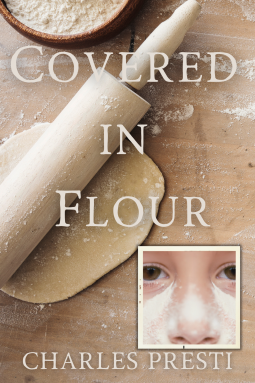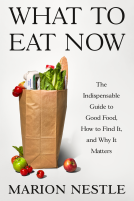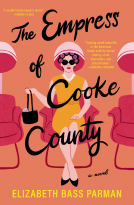
Covered in Flour
1968: A Young Boy's Perspective on School, Family, and Changing Times
by Charles Presti
This title was previously available on NetGalley and is now archived.
Send NetGalley books directly to your Kindle or Kindle app
1
To read on a Kindle or Kindle app, please add kindle@netgalley.com as an approved email address to receive files in your Amazon account. Click here for step-by-step instructions.
2
Also find your Kindle email address within your Amazon account, and enter it here.
Pub Date Oct 10 2023 | Archive Date May 15 2024
Talking about this book? Use #CoveredInFlourJourney #NetGalley. More hashtag tips!
Description
It's 1968 in Whisper Haven, and 8-year-old Carl Pozzi’s world is about to change.
For eight-year-old Carl Pozzi, 1968 begins like any other year—playing kickball with friends and enjoying the comforting aroma of Mom's pasta dinners in their predominantly white suburban Whisper Haven home. But when Carl's teacher introduces lessons about racial prejudice and injustice, his worldview cracks wide open.
How far can innocence stretch before it snaps?
As Carl flips through the pages of his 3-ring binder, each lesson serves as a gateway to a journey of self-discovery and understanding. It's an expedition that not only changes him but reshapes his whole concept of family and justice—especially as he watches his father put on a police uniform during one of the most fraught periods in American history.
"Covered in Flour" is not just a heartfelt stroll down memory lane. It's a captivating coming-of-age saga that digs deep beneath the surface of suburban tranquility. It beckons you to reconsider long-held family values and confront the societal norms you've taken for granted.
Written with genuine love, humor, and a tinge of sorrow, this story blends the nostalgia of tradition with the inevitability of change, offering a stirring mix that leaves you pondering long after the last page is turned. This book isn't just a delightful read; it's a catalyst for introspection, freshly baked and served for your soul.
-----------
This coming-of-age story set in 1960s America contains realistic depictions of racism, police brutality, violence against women and children, the death of a minor family member, family conflict involving substance abuse, and occasional dated offensive language consistent with the historical setting. These scenes further the narrative rather than promote harmful assumptions. They are not graphic. As the issues covered require nuanced maturity and discernment, parental guidance or discretion in allowing younger readers is advised.
A Note From the Publisher
1968. Even decades removed, the year lingers in fragments
of memory with all the stubborn permanence of a
childhood scar. Etched moments, refusing to fade, never
losing potency to provoke. For America, a national coming
of age carved in blood, bullets, and protest signs. But for
me, at eight years old, it was just another year eager with
possibility before harsh awakenings stole innocence.
I see it now as a watershed year—a deluge of inflection
points where destinies might reshape with a single shove or
careless bullet. Martin Luther King Jr. falling to an assassin's
shot in Memphis severed a beacon of hope and rattled the
nation—the slaying of Bobby Kennedy soon after blanketed
dreams of progress in a funeral's pall. As Walter Cronkite's
steady voice presided over scenes of blood-smeared
clashes at the Democratic Convention, the words "breaking
point" took on new potency, though I grasped little.
But back then, I read no budding headlines of history in my
Whisper Haven home, humming to the sounds of sizzling
garlic and my laughing sisters. Worlds away, cries of
freedom met clubs while campaigns toppled to violence.
The ice cream truck's cheerful song held more sway than
news of the protests pleaded by frustrated youth against
the unfolding horrors in the humid jungles of Vietnam,
where year after bloody year, the costs of war mounted. It
was a tumultuous time, one where racial prejudices
increasingly erupted to the forefront by way of frequent
race riots that set cities aflame. Meanwhile, anger over the
escalation of the Vietnam War similarly spilled into the
streets, as youth voices raised in anti-war protests often
met police batons. And my little third grade binder cradled
only the lessons of a kindly teacher with a rainbow dress,
not foresight that the ground under my sneakers and heart
alike would soon rupture.
Children see more than adults wish to reveal. But it was a
teacher seeing something in me that cracked open doors to
ugly truths beyond my leave-it-to-Beaver haven. Does
earlier knowledge of humankind's frailties and hypocrisies
nurture wisdom or fray innocence too roughly before its
time? Even now, I wonder. But I suppose some fruit only
ripens through cold whenever the harvest. So perhaps that
teacher's unintentional lessons were the first pinch of
winter—well-meaning but ultimately hurting towards a
brighter, sobered season.
1968 was many things, but we all lost something precious
along the way.
Advance Praise
“The shrill ring of the telephone from the kitchen desk cut through the silence like a blade, pulling us back to the present moment. No one moved initially; we all exchanged glances before my father's eyes met mine, a wordless cue for me to answer the call.
"Hello?" I said, my voice barely above a whisper.
"Hi, this is Miss Veezi. May I speak with your father, please?" The words sent a shiver down my spine. I paused, then turned toward the table.
"Dad, Miss Veezi is on the phone. She wants to talk to you."
Dad put his fork down, dabbed his lips with a paper towel, and stomped toward the phone. He picked up the receiver and listened. The expressionless mask that had been on his face shifted into a scowl, his eyes narrowing as he listened.”
The long wait is over for Carl Pozzi, as he finally gets the 3-ring binder for school and homework. With a sense of maturity, he approaches the new school year with enthusiasm. Like a sponge, he's eager to absorb everything Miss Veezi can teach him.
While he may lack singing skills, much like his mother, he excels in math. However, Miss Veezi intends to do more than just teach the core subjects like reading, writing, and arithmetic. She is determined to challenge her students with real-life problems and social issues.
Miss Veezi's teaching was nothing short of progressive, but when her teachings clashed with Carl's father’s views, Carl felt torn. Balancing the desire to please his teacher with the knowledge of respecting his father’s views becomes something of a challenge. Especially when he starts to grasp the concept of prejudice and racial inequality. He cannot help but wonder why his father, who is a policeman, despises coloured people so much.
Charles Presti's book, Covered in Flour, provides an insightful window into the mind of an eight-year-old boy during the most turbulent year of the 1960s.
The author effectively transports the readers into the story by appealing to all senses. The baking of bread can be smelt, childhood sweets can be tasted, hugs can be felt, songs can be heard, and the vibrancy of the era can be seen. This is a novel that totally immerses the reader and reminds them what life was like in a seemingly more simpler time. But, it is not all sweetness and light, for this was a period of profound social unrest, where the colour of your skin mattered. 1968 was a year that saw the assignation of Robert F. Kennedy and Martin Luther King Jr. It was also the year of the Glenville Shootout, all of which are mentioned in this novel.
Carl's story is depicted as a memoir. He is a young boy who has a strong zest for life. He is as mischievous as any eight-year-old boy, but he also has a strong desire to learn and to understand what is happening around him. He adores his mother and has a strong respect for his father. Despite his father’s stance on coloured people, Carl sees his father as a kind of superhero - he is a policeman and that in itself demands respect. Carl puts his dad on a pedestal but by the end of the novel, he begins to have a deeper understanding of his father. He also begins to understand the complexity of being an adult. He begins to recognise the responsibility that adults bear and he also begins to understand that behind the joyful family parties, there is an undercurrent of tension. While his grandparents try to keep unity there is a sense that once they have passed on, the family will split and never unite in the same way again. Carl is also awakened to the injustice around him especially when it comes to skin colour. He lives in an area where there are different ethnicities and faiths, but coloured people are unwelcome - he does not understand why this is. Carl came across as very real in the telling and his story is beautifully depicted.
Miss Veezi, Carl's teacher, is a lively character known for her colourful attire and empathetic teaching style. She takes the time to teach the children about the world, especially emphasising racism, prejudice, and injustice. She has two methods for accomplishing this: first, by motivating her students to watch the sitcom "Julia," and second, by encouraging reading literature around the subject. Instead of pushing her opinion, she empowers her pupils to think independently. Through her teaching, she inspires Carl to think independently, which unintentionally makes him wonder at his father’s strong reaction against people of colour. Despite clashes in ideology, Miss Veezi maintains professionalism and doesn't judge Carl based on his father's beliefs. Miss Veezi is someone Carl greatly admires and it is very easy to see why. It was wonderful to see Carl flourish under her gentle teachings, as she is one of those teachers who sparks a passion for learning.
Carl's father, Nick, is a complex character. Despite being popular as a teenager, he had a temper that frequently spilt over at home. As an adult, he is very much the same. Despite not posing a physical threat to his children, they are afraid of his anger and know not to engage in arguments. He is also an unapologetic racist, who hates anyone of colour even if they are his colleagues.
Carl also has the challenge of dealing with his father's disappointment in him - he will never match his father's athletic prowess. But Carl loves his father very much and often fears for him when he is at work. Carl’s relationship with his father really reflects the era the book is set in.
Presti's writing has an authenticity that includes words not typically used today, but they serve as a reminder of the social history of the period. The historical details in this book also feel extremely authentic, which allows the reader to easily immerse themselves in the story and era.
The enthralling story of Covered in Flour by Charles Presti keeps readers engaged from beginning to end. If you're craving pure nostalgia, then this novel is definitely for you. With its entertaining narrative, this story really does tick all the boxes.
I Highly Recommend.
- Mary Anne Yarde, Best Selling Author & Coffee Pot Book Club Review
Marketing Plan
Charles Presti, emerging from the sun-drenched shores of Pensacola, Florida, crafts narratives that echo with the richness of his varied life. His journey from a USF College of Medicine graduate to a storyteller is as unconventional as it is inspiring. Drawing from his days as a physician and informatics specialist, Charles infuses his writing with a rare blend of scientific precision and heartfelt emotion. His debut novel, "Covered in Flour," is a vivid tapestry of his Italian-American heritage, his experiences in the whirlwind era of the 1960s, and his personal journey as a gay man. These elements converge to create stories that not only entertain but resonate deeply with themes of family, discovery, and the delicate dance of life's everyday moments.
Charles's passion for storytelling is paralleled only by his commitment to fostering diversity and inclusion. Alongside his husband, Mike Bruce, and their beloved Wheaton Terrier, Zoey, he is a vibrant force and founder of "Sunday's Child," a local charity dedicated to nurturing inclusion and empowering LGBTQ+ and other marginalized communities through grants to local charities. A pillar in the Emerald Coast Writers group, he continually explores the nuances of identity, heritage, and a sense of belonging.
Discover more about Charles's captivating world of "Covered in Flour" at www.coveredinflour.com, where each story is a window into a life lived fully and authentically.
Read more about the author at www.charlespresti.com along with Book Blog Tours and Signings.
Available Editions
| EDITION | Paperback |
| ISBN | 9798863876832 |
| PRICE | 12.95 |
| PAGES | 199 |
Links
Available on NetGalley
Readers who liked this book also liked:
Kalan Chapman Lloyd
General Fiction (Adult), Literary Fiction, Women's Fiction


















